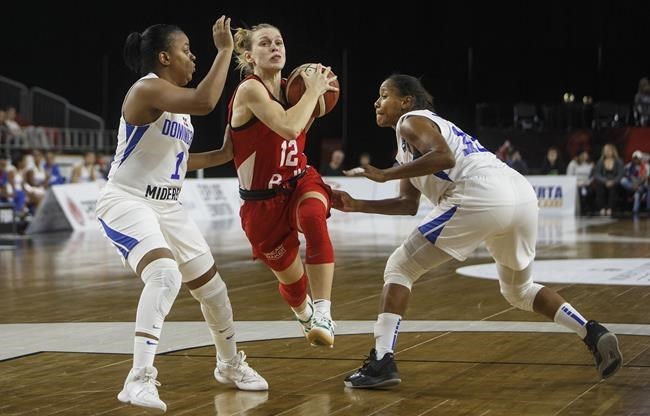Ruth Hamblin, Jamie Scott, and Miah-Marie Langlois were on a train in Eastern Europe a few weeks ago. They were supposed to get off in the Czech Republic, but nobody gave them a heads up.
Being the only English-speaking players on WBC Dynamo Novosibirsk of the Russian women's league, it wasn't until the trio spotted the team doctor scurrying off that they knew enough to grab their bags and run for the doors. Had they missed their stop, the next one was Krakow, Poland.
The best in Canadian women's basketball are accustomed to plying their trade at outposts around the world. Hamblin, Scott and Langlois can only laugh about their misadvantures, cherish their experiences, and know that the ability to deal with adversity makes them stronger on the court and off.
"Just the resilience that you get from being in a foreign land, and also you come into these teams and a lot is on your shoulders, you're expected to produce, so I think that those are experiences and moments of growth that we really carry into (time with the national team)," Hamblin said.
The Canadian women's team gathered this week in Ostend, Belgium, for its final push for a third consecutive Olympic berth. The Canadians, which went 3-0 in the pre-qualifying event in November in Edmonton, face host Belgium on Thursday, Sweden on Saturday and Japan on Sunday. They need only to finish top-two to book their tickets to Tokyo (Japan automatically qualifies as the host country).
It took the trio two four-hour flights to get to Belgium. But that was nothing.
Novosibirsk is an industrial city in Siberia, with average temperatures in winter that rival the Canadian Prairies. It's also a four-and-a-half-hour flight from Moscow, through which they have to connect for every one of their away games. Then it's either a long train ride or another flight to their destination.
"I'll probably mostly remember the crazy travel," said Scott, who led the Russian women's league in scoring last season with 19.3 points a game. "You almost never get used to being on one time zone . . . sometimes we have to be on 24-hour train rides. So you never really get comfortable in one time zone.
"I think I'm just constantly tired. In saying that, a lot of funny things come out of it, me, Ruth and Miah so tired and jet-lagged, looking at each other like: this is really the life we're living right now. We just laugh about it."
The three are all starters for Dynamo Novosibirsk. Langlois, a 28-year-old from Windsor, Ont., was the first to join the team four years ago, and was its only English-speaking player at the time.
"I had a translator with me all the time, during practice, or if I needed to order a delivery, she would do it for me. She was my voice pretty much," Langlois said.
Being a black woman in Russia was one of the toughest adjustments.
"The opportunity that Canadians have, me being a minority, being a black female in Canada, it's very diverse," she said. "And it's definitely a man's world out there. The rest of the world is not where we are. So you really appreciate Canada so much more, and the opportunity that's given."
Hamblin, a 25-year-old from Smithers, B.C., is making the most of the experience. She chronicles her travel adventures on social media with the good-natured humour of Michael Palin.
"I go into life just trying to make the most of everything, and how many people can say they get a chance to live in Siberia for a year?" she said. "So I try to get the most of those experiences, and experience the culture, and it helps having Jamie and Miah there, it's a lot of fun to be able to hang out with them and go through all these experiences with them too."
Hamblin tried dogsledding last week. But her most memorable tourist experience was a traditional Russian banya — or bathhouse. Bathers whip themselves with oak branches that are bound together. It's believed to improve circulation.
"I felt very relaxed after though," Hamblin said with a laugh.
All three said the culture shock was huge. Different language, different alphabet, completely different vibe, Hamblin said. But it's also led to plenty of laughter between the trio of Canadians.
"(I'll remember) just the funny moments where we don't really know what's going on, those exchanges between me, Jamie and Miah, the eye contact, like 'What the heck is happening right now?'" Hamblin said. "It's really funny but it's also you're experiencing things that you never would've imagined going through."
Hamblin has learned enough Russian "for basic survival. Please and thank you. Can count to 10. Know the names of our plays in Russian. I think over these next three months I'll really try and learn some."
This is the third and final Olympic qualifying phase for the Canadian women, who said it's like a family reunion when they get together. It doesn't take long to rediscover their seamless cohesion when they step on the floor.
"Especially this year having so many different little touchpoints, we really see that in the chemistry, just the interactions of the first day, and already we're in Day 3 of practice and I feel like we're miles ahead of where we were in November, so that's really cool to see," Hamblin said.
The Canadian women, who are ranked an all-time best No. 4 in the world, were eliminated in the quarter-finals in both the 2012 London and 2016 Rio Olympics.
The Canadian men haven't qualified for the Olympics since the 2000 Sydney Games. They must win their last-chance qualifying tournament in Victoria in late-June.
This report by The Canadian Press was first published Feb. 3, 2020.
Lori Ewing, The Canadian Press

